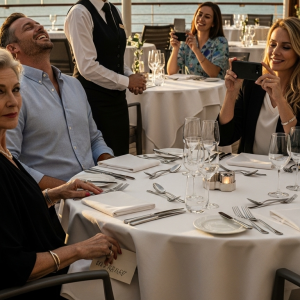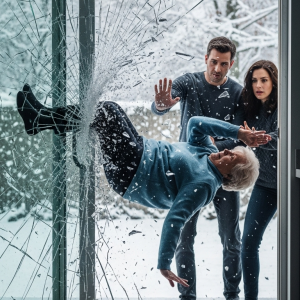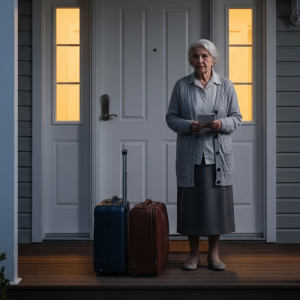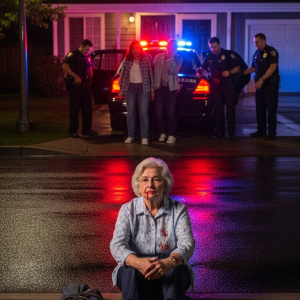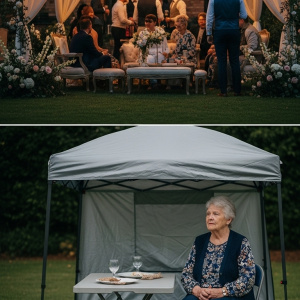I was supposed to be on a flight to Portland. My bag was checked, my boarding pass was a crisp rectangle in my coat pocket, and my sister’s lakeside cabin was waiting, promising a week of quiet reading and the scent of pine. But as I pulled into the long-term parking lot at the airport, a jolt went through me, cold and sharp. The will. Arthur’s will. The original, not the copy I kept in my desk.
I turned the car around, annoyed at my own forgetfulness but figuring I’d be in and out in five minutes. It was a simple mistake. But what I walked into was not simple. It was the kind of moment that divides a life into a before and an after. It was the sound of my own son, my only child, meticulously planning my erasure.
The front door creaked softly as I pushed it open. I didn’t call out, a strange instinct silencing me. The air in the house felt unnaturally still. My keys, usually dropped into the ceramic bowl on the hall table with a familiar clatter, remained clutched in my palm. Something in my chest went quiet, listening.
I stepped into the hallway, my shoes brushing silently against the hardwood floor. The voices drifted from the study. They were low, deliberate, and careful. I pressed my back against the wall just behind the archway, my breathing shallow.
“If she’s showing these signs, we can make the case,” said a voice I knew as well as my own. Grant.
“She’s seventy-four,” another voice replied, smooth and professional. “With the right filing, diminished capacity isn’t difficult to demonstrate.” Ashby. That was the name. The lawyer Grant had brought around after my husband, Arthur, passed away, under the guise of helping sort out Dad’s affairs.
My heart began to thud, a slow, heavy beat against my ribs. I couldn’t see them, but I could feel the cold architecture of their conversation. They were talking about guardianship. They were talking about me.
“I’ve already started compiling the list,” Grant continued, his tone clinical. “She’s been misplacing things, repeating stories. She barely touched her taxes last year.”
I wanted to step forward. I wanted to shout his name, to see the shock and shame on his face. But instead, a cold, clear instinct made me back away, placing each foot with surgical care, praying the old floorboards wouldn’t betray me.
Outside, the afternoon sun was warm on my skin, but everything inside of me had turned to ice. I got back into my car and sat there, staring through the windshield, the keys still cutting into my palm. The woman who had raised him, who had worked night shifts in dusty archives so he could attend college without loans, was now being cataloged like a specimen, her life reduced to a list of perceived failings.
I pressed my lips together, not in anger, but in a profound, soul-shaking disbelief. That was the moment something inside of me shifted. It didn’t shatter, not yet. But the warmth in my chest, what was left of it after Arthur’s passing, began to cool into something hard and resilient. The hardest part wasn’t what I heard. It was the sudden, horrifying realization of how long I’d ignored what I already knew.
I didn’t go back to the airport. I didn’t call my sister to tell her I wasn’t coming. I just kept driving, my hands steady on the wheel as my mind floated through a fog of memories, now rearranging themselves into a new, terrible clarity. I passed the turnoff to the interstate, letting instinct guide me through old streets I hadn’t seen in decades.
By the time I stopped, I was parked in front of a small bakery, tucked between a laundromat and a faded barber shop. The awning was new, but the smell drifting through the open door was an anchor to the past: cinnamon, butter, and toasted almonds. This was the place Arthur had brought me every Sunday, back when Grant was just a boy with scraped knees and a mind full of blueprints.
I walked inside. The tables were still mismatched, each with a little vase of flowers. I ordered a coffee and sat by the window, my fingers curled around the warm mug. I remembered Arthur reading the paper at this same table while Grant stacked sugar packets into elaborate towers, asking endless questions about how the world worked. He hadn’t wanted simple answers; he wanted to understand the mechanics of everything.
And I had given them to him. I brought home books from the library, signed him up for robotics camp, and nurtured his curiosity. He was a builder, not a taker. At least, he used to be. Somewhere between that boy and the man in my study, a quiet corrosion had taken place. His insistence on handling Arthur’s estate, telling me it was “too much for me.” His replacement of our trusted family accountant with a firm I’d never heard of. His setting up automatic payments for my bills without asking. I had seen them as acts of a caring, if overbearing, son. Now, I saw them for what they were: the methodical seizure of control.
The parking lot behind the public library was mostly empty. I pulled into the same spot I used to favor when I worked there, a creature of habit. Inside, the smell of ink, dust, and old wood wrapped around me like a familiar coat. It was a scent that had always made me feel calm, capable, whole.
I walked past the fiction stacks and into the archives room in the back. I asked the young woman at the desk if I could review a document I had once cataloged: a copy of my husband’s will. She nodded, sliding a clipboard toward me. My hands knew exactly where to look, my fingers finding the right file folder with an ease that felt like coming home.
The will itself was straightforward, but the folder was thick with Arthur’s notes. He had annotated everything, his clipped handwriting filling the margins. He had trusted my ability to read between the lines. I spread the pages out, and my eyes caught on the sticky notes he had left inside. One read: Dolores, if you ever feel unsure, the answer is always in the numbers.
I turned to the last page, a breakdown of our assets. Next to each entry was a note: “D to retain.” “D or Grant, if qualified.” “Legal hold until independent review.” Not “Grant to manage.” Not “Full access for son.” Arthur had been precise. He had seen a potential for overreach, and he had built a quiet firewall to protect me. He had trusted me.
The heat that rose in my chest was not anger. It was recognition. It was the sensation of finally slipping back into my own skin. I pulled a notepad from my bag and began to make a list. 1. Copies of all documents. 2. New legal counsel. 3. Audit of recent account changes. I underlined each one with slow, steady pressure. By the time I left the library, the sun had set. The cold air didn’t bother me. For the first time in months, I didn’t feel old, or confused, or managed. I felt like Dolores Whitaker, and I was going to find my way back, one document at a time.
The next morning, I moved through my home with a new, deliberate slowness. I tucked a small voice recorder, one I used to use for interviews at the library, into the soft wool lining of my coat. I left the front door unlocked. I made tea, spilling a little on the counter, and left the kettle slightly ajar. I was creating a scene, setting a stage with subtle messes that could be mistaken for forgetfulness.
Grant arrived at 10:30, unannounced as usual. He carried a grocery bag and wore the careful, patient smile he used when he wanted something. I sat at the kitchen table in my robe, a half-finished crossword puzzle in front of me. The performance began.
He kissed my cheek, commenting on the chill in the house. I nodded vaguely, saying I must have forgotten the heat again. He unpacked the groceries—soup, bread, crackers—like a visiting nurse. He asked how I’d slept. I said I wasn’t sure, then changed the subject mid-sentence. When he offered to warm the soup, I smiled a vacant, grateful smile.
He moved around my kitchen like someone taking inventory, his eyes scanning the calendar, the pill bottles by the sink, the unopened mail. He commented on a letter from the insurance company; I said I hadn’t gotten around to it. He offered to go through it for me; I pretended not to hear.
After lunch, he leaned against the doorframe, his expression one of profound, somber concern. “Mom,” he began softly, “I’ve been researching some care homes. Just options. Places with gardens, music therapy… staff trained in memory care.” He said it like it was the kindest thought in the world.
I blinked slowly, then smiled faintly. “It might be nice to have someone else do the cooking,” I murmured. Then I looked up at him and asked, “What day is it again, dear?”
A look of deep satisfaction settled on his face. He thought he was winning. As he packed up the dishes, I stared out the window, my posture slumped. The recorder in my coat had been running the entire time. Every word, every pause, every calculated kindness was now a file. After he left, I locked the door and sat down in the study. My hands didn’t shake. The silence in the house, once unbearable, had become my greatest ally.
The next morning, I found Mellen’s old number in a yellowed rolodex. We had worked together for fifteen years at the university library. Mellen was sharp, pragmatic, and could spot the flaw in any plan before it unraveled. I left a message, my voice calm and direct, telling her I needed a legal mind I could trust, and that it was personal. She texted back within the hour: I’ll be there at four.
When she arrived, her presence filled the room without taking it over. We sat at the kitchen table. I didn’t offer explanations; I just slid the recorder and the file of Arthur’s will across the table. She listened to the entire recording, her expression unreadable. When it ended, she looked up at me, her gaze steady. “We’re going to fix this,” she said. It wasn’t a promise; it was a statement of fact.
She opened her laptop, her fingers moving with quiet efficiency. She asked about my existing power of attorney. I told her it hadn’t been updated since Arthur passed. “Good,” she nodded. “First, we revoke Grant’s authority. Then, we draft a new will, designate a trusted executor, and notify the state. Everything will be documented and timestamped.”
For the next hour, she outlined a clean, quiet, legal strategy. She helped me set up encrypted cloud storage, creating a dedicated folder labeled DOLORES_LEGAL_PRIVATE. Before she left, she placed a single sheet of paper in front of me. It was a formal revocation of power of attorney. I signed my name, my handwriting firm and clear. This, she said, was the first step. After she left, the house was quiet again. But it was no longer an empty quiet. It was the sound of a foundation being rebuilt.
Mellen had given me a checklist, but I soon found I didn’t need it. The rhythm of protecting myself became a new routine, as orderly and comforting as archiving a historical collection. I started with my medical records, scheduling a full cognitive evaluation with my long-time physician, Dr. Elkins. He ran the assessment and handed me a signed letter: “Cognitively sound, no signs of impairment.” I slid it into the file folder that now went everywhere with me.
Back home, I began to archive my own life. Grocery receipts, bank statements with handwritten notes, printed emails from the last two years. I dated each page, organized them into categories—Legal, Medical, Personal—and labeled the folders with clear, consistent titles. I scanned every page into my new secure cloud storage, each file saved with a timestamp, each document a small, solid brick in the wall I was building.
In the back of my closet, I found a box labeled ARTHUR – MISC. Inside, among old travel brochures, was a single, folded page, handwritten in his bold script. It was dated ten years ago. It read: “If the day comes when our son makes you doubt yourself, trust your instinct. You’ve always seen clearer than you believe.”
Arthur had known. Not the details, but the potential. He had seen a weakness in his son’s character that my mother’s heart had refused to acknowledge. I was ready to see it now. That night, I backed up everything again, sent copies to Mellen, and stored a flash drive in my safety deposit box. I wrote a final note in my journal: There is no such thing as overprepared when someone is trying to erase you. And for the first time in weeks, I slept through the night. I was no longer playing defense. I was documenting my survival.
Grant arrived on a Wednesday, his expression the perfect blend of concern and duty. He carried a small bouquet of supermarket tulips and a bag with another container of soup. We sat at the kitchen table, and he began his gentle interrogation, asking if I’d considered hiring someone to check in, talking again about the assisted living communities. He said he deserved rest, that it wasn’t safe for me to be alone. I let my spoon linger in my broth, my hands moving slowly. I watched him watch me.
When he offered to drive me to tour one of the places, I smiled faintly and said, “Perhaps.” The small recorder on the bookshelf, hidden behind a stack of books, captured it all. Every careful word was now archived.
Three days later, Mellen delivered our formal response to Ashby’s office in person. The envelope was heavy with documentation: the affidavit of mental capacity, the newly notarized power of attorney, the updated will, and a notice declaring all prior authorizations null and void. That evening, she called me. Ashby had contacted her personally. He said he had reviewed the file and would be stepping back. Then he added, without prompting, that Arthur had once done him a great favor. It wasn’t a confession, but it was a crack in the wall Grant had built.
The next day, a letter arrived by courier. It was from Ashby, formally stating he would no longer be involved. Enclosed was a printed record of every document filed on my behalf in the last six months. It was Grant’s entire playbook. The draft declarations of concern, the template pages for affidavits from neighbors, the emails. His quiet words to me over soup were repeated, word for word, in a proposal for guardianship.
I knew he would come. The letter from Ashby had cornered him. He arrived without warning, a folder under his arm, his shoulders tight. I met him at the door and led him to the kitchen, where I had cider warming on the stove. He placed his folder on the table and remained standing.
I poured two cups and sat across from him. He began softly, saying that Ashby had stepped away, leaving things unclear. He said he had concerns about paperwork being changed without his knowledge.
I took a sip of cider. Then I reached into the drawer beside me and pulled out a small stack of papers. The new power of attorney. The updated will. The statement from Dr. Elkins. The notarized affidavit of capacity. I slid them across the table, one by one.
He just stared at them.
“I have made decisions for myself, Grant,” I said, my voice clear and steady. “Legal ones. Responsible ones. I know exactly what I am doing. And pretending otherwise will not change that.” His jaw tightened. I watched him search the room, looking for evidence of an accomplice, for some sign that I was bluffing.
Then I said, simply, “Not all silence is weakness.”
He stood still for a long moment. Then he gathered his folder, turned, and walked to the door. He didn’t slam it. He didn’t speak another word. He just left. After the sound of his engine faded, I walked to the table, picked up the recorder I’d hidden beneath a napkin holder, and stopped the recording. The confrontation was over. And it had been perfectly, quietly, mine.
The silence that followed was different. It wasn’t empty. A few days later, Mellen’s daughter, Tessa, arrived with a canvas duffel and a laptop bag. She was studying archival science and needed a quiet place to finish her thesis. She moved into the guest room with an easy confidence, her presence filling the house not with noise, but with life.
She hummed a folk song while making tea. The sound of her steady typing from down the hall reminded me of Arthur’s old typewriter, an anchoring rhythm in the quiet. She took out the trash without being asked and started digitizing my old library notebooks, treating my history with a gentle, professional respect.
The house was no longer just a house; it was a home again. The floors needed sweeping more often. The kitchen had fingerprints on the counters. The rooms no longer echoed.
Grant called one night. I saw his name on the screen and let it ring. Later, Tessa and I sat at the dining table, planning to organize the boxes in the garage. Saying yes to her felt like saying yes to motion, to a life beyond defense. I wrote a single sentence in my journal that night: The house is no longer quiet, and neither am I.
There was no grand finale, no cinematic showdown. There was only the slow, deliberate walk back to myself. I had been overlooked, dismissed, and nearly erased. But I learned that dignity doesn’t need permission. My victory wasn’t loud. It was the quiet, unshakeable knowledge that my story was, and always had been, my own to write.
